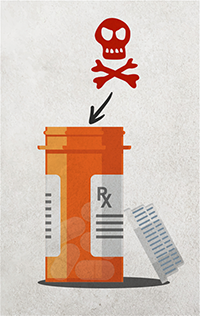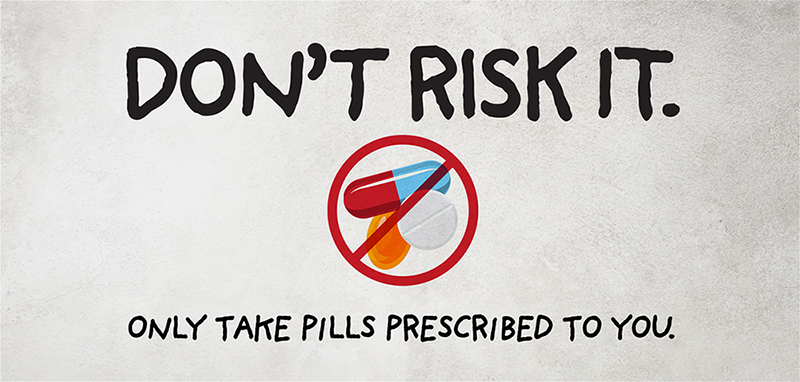Prescription Drug Safety
People often think that prescription drugs are safe because they are prescribed under the guidance of a healthcare provider, but these medicines can have risks and can be just as dangerous as other drugs when misused and abused.
What is prescription drug misuse and abuse?
- Taking a prescription medication in a way other than instructed, even if it is your own prescription.
- Getting and using someone else’s prescription medication, even for a medical reason.
- Mixing prescription drugs with other medicines, or substances, such as alcohol to achieve a certain effect in the mind and body.
- Taking a prescription medication to get high.

What are risks associated with prescription drug use?
Prescription drug misuse is illegal and can lead to dangerous health issues. Misusing any type of drug that alters judgement can cause a person to do risky things they wouldn’t normally do. Using drugs can affect school, sport, and work performance and have negative impacts on relationships with family and friends. Without talking to a doctor, you won’t know how a prescription drug will affect you.

Most Commonly Misused Prescription Drugs
Each class of prescription drugs affects the brain and body differently. The three most commonly misused types of prescription drugs are Opioids, Central Nervous System (CNS) Depressants, and Stimulants.
-
Opioids
Learn MoreMEDICAL USES Used to treat moderate-to-severe pain or to relieve coughs or diarrhea. COMMON PRESCRIPTIONS - hydrocodone (Vicodin ®)
- oxycodone (OxyContin ®, Percocet ®)
- morphine (Kadian ®, Avinza ®)
- codeine
- fentanyl
POSSIBLE SIDE EFFECTS - Euphoria (feeling a “rush”)
- Drowsiness
- Confusion
- Nausea
- Constipation
- Slowed Breathing
- Hypoxia (too little oxygen to the brain), coma, permanent brain damage or death
-
Central Nervous System (CNS) Depressants
Learn MoreMEDICAL USES Medicines used to treat anxiety, panic attacks, and sleep disorders, such as insomnia. COMMON PRESCRIPTIONS - diazepam (Valium®)
- clonazepam (Klonopin®)
- alprazolam (Xanax®)
- zolpidem (Ambien®)
POSSIBLE SIDE EFFECTS - Slurred speech
- Poor concentration
- Confusion
- Headache
- Light-headedness
- Dizziness
- Dry mouth
- Problems with movement and memory
- Lowered blood pressure
- Slowed breathing
-
Stimulants
Learn MoreMEDICAL USES Used to treat attention deficit hyperactivity disorder (ADHD) and narcolepsy (uncontrollable episodes of deep sleep). COMMON PRESCRIPTIONS - dextroamphetamine (Dexedrine®)
- dextroamphetamine/amphetamine combination product (Adderall®)
- methylphenidate (Ritalin®, Concerta®).
POSSIBLE SIDE EFFECTS - Euphoria (feeling a “rush”)
- Increased blood pressure and heart rate
- Increased breathing
- Decreased blood flow
- Increased blood sugar
- Opened-up breathing passages
At high doses, prescription stimulants can lead to a dangerously high body temperature, an irregular heartbeat, heart failure, and seizures
Repeated misuse (even within a short period) can cause psychosis, anger, or paranoia
Prescription drug use, even as prescribed by a doctor, can cause some people to develop a tolerance, which means they need higher and/or more frequent doses of the drug to get the desired effects. Drug dependence occurs with repeated use, causing the brain to only function normally in the presence of the drug. The absence of the drug can cause reactions called withdrawal effects. These effects can range from mild to life-threatening. The misuse and abuse of prescription drugs can lead to substance use disorder (SUD), a medical illness, which ranges from mild to severe and from temporary to chronic. Addiction is the most severe form of an SUD and is characterized by compulsive, uncontrollable drug-seeking despite harmful consequences. When a person uses enough of the prescription drug to produce life-threatening symptoms or death, they can overdose. If you suspect someone has overdosed, the most important step to take is to call 911 so they can receive immediate medical attention.
For more information on prescription drugs or other substances, visit the National Institute on Drug Abuse (NIDA).
What if I know someone who needs help?
IN AN EMERGENCY: If someone you know is experiencing severe symptoms or is in immediate danger, call 911 or visit the Emergency Department.
If you, a family member, or friend are experiencing a substance use and/or mental health crisis and need to speak with someone now, contact the Suicide and Crisis Lifeline by calling 988 or chat at 988lifeline.org or use the Crisis Text Line by texting “HOME” to 741741. Trained counselors are available 24/7 for free, confidential support.
What do I do if I am prescribed a medicine from my doctor or dentist?
- Talk about your medical history and any medications you’re taking. It might not be safe to take certain prescriptions with some other medicines.
- Talk about the risks and consider asking if there are different treatment options that could work.
- Tell the doctor or dentist about any substance use disorders or addiction in your family. This will help the healthcare provider to decide if certain prescriptions, such as opioids, are safe for you.
- Take the prescription drug exactly the way they were prescribed, and never use them for any other reason. Never share medications with anyone else.
- Safely dispose of unused or expired medicine.
Safe Medicine Disposal
The proper disposal of your unused, unwanted, or expired medication will decrease the opportunity for anyone to misuse or abuse these drugs. Unless stated on the packaging, medicine should not be poured down the drain or flushed down the toilet. Expired or leftover medication can often be returned to a pharmacy or police station for proper disposal.
Visit takebackday.dea.gov to locate a collection site to safely dispose of medication.
